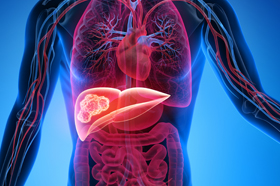Researchers Identify Biomarkers That Predict Immunotherapy Response in HCC
 Novel biomarkers that predict a patient’s response to immunotherapy as well as the adverse events they may experience from the same immunotherapy used to treat primary liver cancer hepatocellular carcinoma (HCC) have been identified by researchers in Singapore. The findings, published in the Journal of Hepatology, should enable more effective and individualized treatment of HCC patients, with fewer side effects.
Novel biomarkers that predict a patient’s response to immunotherapy as well as the adverse events they may experience from the same immunotherapy used to treat primary liver cancer hepatocellular carcinoma (HCC) have been identified by researchers in Singapore. The findings, published in the Journal of Hepatology, should enable more effective and individualized treatment of HCC patients, with fewer side effects.
Liver cancer is highly prevalent in Asian populations, especially in Southeast Asia, China, Korea and Japan. In Singapore, it is the fourth most common cancer and the third leading cause of cancer mortality for men. With the high incidence of this disease in the region, finding effective treatments for HCC is an urgent need. Personalized medicine is a promising approach for HCC treatment, matching specific therapies to patients to ensure effective treatment with minimal toxicity. Biomarkers, which are unique mutated nucleic acid sequences or proteins associated with a particular cancer type, can indicate the likelihood of developing cancer, diagnose the cancer, predict therapeutic benefit and prognosticate cancer development in a patient.
Using a personalized medicine approach, a team of researchers and clinicians from the National Cancer Centre Singapore (NCCS) and SingHealth’s Translational Immunology Institute (TII) uncovered mechanisms of response and adverse events from the type of immunotherapy known as immune checkpoint blockade used to treat HCC patients. Recent phase III clinical trials of the anti-PD-1 immune checkpoint blockade nivolumab and pembrolizumab achieved a respective 15% or 18.3% overall response rate for patients with advanced HCC. However, about 20% of these patients experienced treatment-induced immune-related adverse events such as skin toxicities, hepatitis, thyroid dysfunction and colitis. Additional studies showed that combining anti-PD-1 and another immune checkpoint blockade, anti-CTLA4 or an anti-angiogenesis drug, anti-VEGF, improved response by up to 31% but with an increased incidence of adverse events.
To improve and predict response rates to immune checkpoint blockade therapy, the team studied 61 HCC patients from NCCS and Asan Medical Center in South Korea who received anti-PD-1 immune checkpoint blockade – intravenous nivolumab or pembrolizumab. The patients’ blood samples were collected at baseline, before the study began, and during treatment. Samples were analyzed using advanced single-cell analyses such as Cytometry by time of flight (CyTOF) and single-cell RNA sequencing.
From the analysis, the team identified two novel biomarkers: CD11c+HLADRhi antigen-presenting cells (APCs) and CXCR3+CD8+ effector memory T cells (TEM) that could predict response to the anti-PD1 immune checkpoint blockade. In addition to the initial discovery, the team discovered that one of the novel biomarkers (CXCR3+CD8+ TEM cells), contributed both to patients’ response and the incidence of adverse events from immune checkpoint blockade. This provides valuable insight into the interface between a patient’s response and side effects to the therapy.
“While other studies have explored biomarkers for response to immune checkpoint blockade, ours is the first that found a biomarker that contributed to both the responses and adverse events resulting from the immunotherapy,” said Dr Valerie Chew, a principal investigator in TII and co-senior author of the study. "This allowed us to examine this biomarker further and determine if there was a way to enhance therapeutic response and, at the same time, prevent adverse events.”
Based on their findings, the team proposed and tested a new immunotherapy combination for HCC in a preclinical mouse model. This novel treatment combined anti-PD-1 and anti-TNFR2, blocking a communication pathway that uncoupled the response from adverse events. This allowed enhanced response to immune checkpoint blockade without aggravating adverse events.
“We are excited that our findings have presented a novel treatment pathway, and are now exploring this combination and aim to bring this new therapy to patients with primary liver cancer,” said Clinical Associate Professor David Tai, Senior Consultant, Division of Medical Oncology, NCCS and co-senior author of this study.